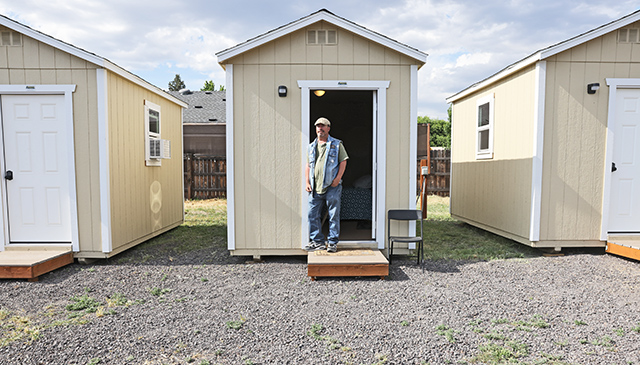The impact of the Safeway shooting may affect people who don’t realize they’re victims, too
Published 4:45 am Sunday, January 22, 2023

- Dr. Michael Conner, a Bend psychologist, in his office.
The shooting last summer at the east Bend Safeway was an emotional event for the dozens of people who were at the store but that sense of trauma has been felt by much of the city.
It’s a ripple effect that needs to be acknowledged by people who may not see themselves as victims of the shooting, but who nonetheless suffer from post traumatic stress.
People may say they feel OK now, but left untreated, post traumatic stress can surface at different times.
“They may feel fine and then something happens and they are triggered, or have a full on meltdown,” said Dr. Michael Conner, a Bend psychologist. “Generally, treatment for this can take six months to years.”
Conner is treating one of the former Safeway store managers, Sophia Aquarius, and specializes in traumatic stress.
Aquarius, who was working at the store when the shooting began at 7:04 p.m. Aug. 28, had been in the exact spot moments before the gunman killed customer Glenn Bennett, 84.
She and a coworker hid in the women’s restroom while the shooting occurred. Also killed was Donald Surrett Jr., a 66-year-old produce grocery clerk.
Months after the incident, Aquarius can talk about the shooting and where she was at the time, but has difficulty expressing her feelings toward the gunman. A direct question about how much survivor guilt she feels or if she’s angry at the gunman, produces a response about something else.
“She’s not ready to think about it now,” said Conner. “She is feeling internal conflict.”
Aquarius’ response is no different than what others are experiencing. This is why it’s so important for strong support immediately after an event.
Immediately after the Safeway shooting, Deschutes County and the District Attorney’s Victim Assistance program joined Deschutes County Health Services to establish an incident response center at Pilot Butte Middle School. It was open to anyone affected by the shooting to come and talk about their feelings, said Shannon Brister-Raugust, Deschutes County Health Services behavioral health program manager.
Deschutes County’s Critical Incident Management Response team, comprised of mental health professionals, county service providers and medical professionals, and members of the District Attorney’s Victim Assistance Program provides a place for crime victims to talk about an incident, watch videos of an incident and share their experiences.
For those directly involved in the incident, sometimes these sessions can be harmful because they’re not the typical standard of care, and don’t address the trauma long term, Conner said. They only address the trauma in the moment, he said.
“(They) feel good for a while, but when they finally start to break down, they may have forgotten when they need to get help or where to go and what to say,” Conner said. “What the county set up was well intended but required traumatized people to participate in large groups and then expected those people to seek help that was not available in proportion to the need.”
About 200 people came to the school seeking help, said Brister-Raugust. After a while, when the need became a trickle, the response team was moved to the county’s stabilization center, she said.
Team members also went door to door in the neighborhood behind the Forum Shopping Center and to the retirement community across the street, said Ashley Beatty, Deschutes County District Attorney’s office Victims Assistance program manager.
“We tried to remove as many barriers as we could in the community,” Beatty said. “Trauma takes a while for things to settle in. Sometimes we convince ourselves that we’re fine, but as time moves on its apparent we’re not. We want the community to know we’re still here.”
The response team also obtained financial help for people who experienced financial hardships related to the shooting. Job loss, insurance copayments and counseling can get reimbursed by the state-funded Victims Compensation Fund. To date no one has applied for financial help under the fund, she said.
Conner said that could be because the process is complicated.
He and his office manager invested time to learn how to submit a claim on behalf of his patients, but have opted instead to write off the co-pays and deductibles that the patients can’t afford.
The county works to coordinate a response in emergencies, pulling in behavioral health professionals, St. Charles Health System and the district attorney’s office. In retrospect, there were some gaps that developed, particularly when it came to communicating with large corporations, Beatty said.
Conner also pointed out that when employees contact therapists linked to their employer’s assistance programs, they often can’t get to a mental health professional and then can’t get the help they need.
That can cause frustration and confusion, he said. Victims need advocates to help them navigate the challenges, he said.
Self-care is vital after an incident like this, Brister-Raugus said.
“Our job is to provide support,” Beatty said. “We tried to be trauma informed and provide services especially to those directly affected by the incident.”
The Deschutes County District Attorney’s office has resources to help victims of crimes such as the shooting that occurred at the east Bend Safeway. The Victims Assistance Program can help victims navigate the criminal justice process, obtain crisis intervention counseling, have an advocate or obtain information, obtain referrals for community services, restitution and compensation.
To obtain help click here or go to: https://www.doj.state.or.us/crime-victims/victims-resources/victims-services/compensation-for-victims-of-crime/






